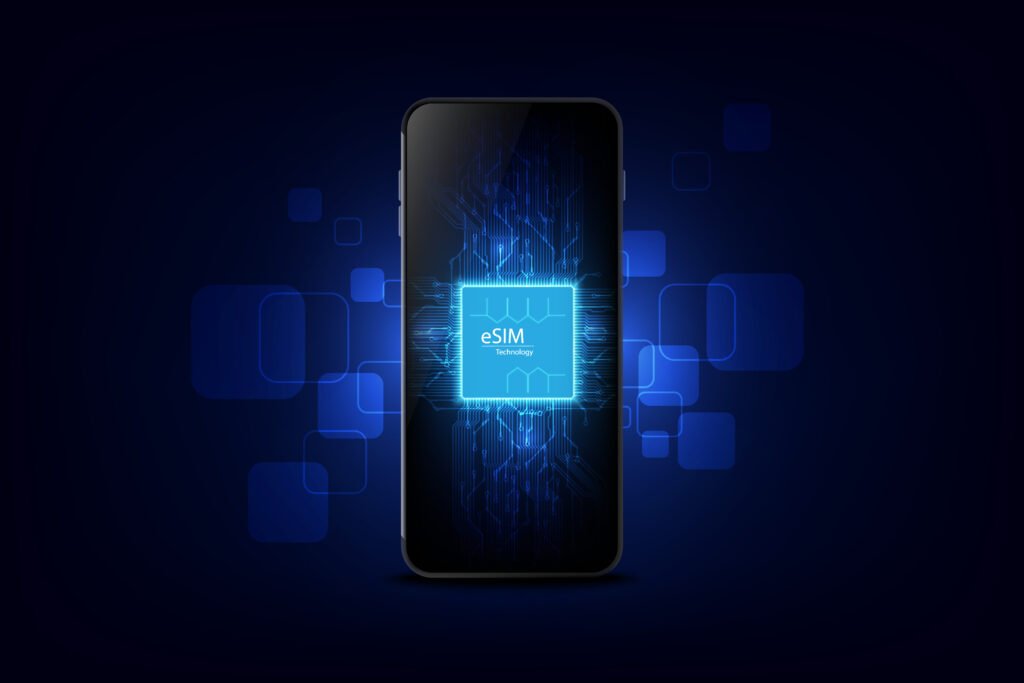- 2.1 Protecting Personal Information with eSIMs
- 2.2 Biometric Authentication
- 2.3 Encryption
- 2.4 Advantages of Biometric authentication and encryption
- 2.5 Choosing an eSIM Provider for Travel: Introducing the Yesim.app
Traveling with a smartphone has become a necessity. However, it also poses a risk of disclosing personal data to cyber-attacks. This is where eSIMs or embedded SIMs come in. Unlike traditional SIM cards, eSIMs are embedded directly into devices like iPhones SE, providing convenience, security, and flexibility for international travelers. This article explores the advantages of eSIMs for travelers, including cost savings on roaming charges, high-speed data connectivity, and advanced security features like biometric authentication and encryption.
Today, travel has been made easier than it could ever be in the current digital world. As more people own smartphones and use mobile internet connectivity, being easily contactable while traveling has become essential. On the one hand, this is convenient, but it also risks disclosing personal data to cyberattacks. It is at this point where eSIMs and data protection come in.
What are eSIMs?
A new type of SIM card called an eSIM, or embedded SIM, is built into a phone like an iPhone SE eSIM. Unlike physical SIMs, which must be inserted into mobile devices, eSIMs are mounted on the boards of the same device, providing more convenience and security. As a result, eSIMs may have several profiles programmed for different countries so that users neither need to travel with multiple SIM cards nor have to physically swap out SIM cards when traveling internationally. A SIM card based on a chip with this feature, specifically, will benefit frequent travelers by eliminating the time-consuming and costly practice of constantly purchasing new SIM cards. Moreover, eSIMs provide a high level of security with built-in biometric authentication and encryption to shield private customer data, making them safer than conventional SIM cards. In general, the main advantage of a virtual SIM card is that it is easier, safer, and more flexible for international travelers than traditional SIMs.
Why eSIMs are advantageous for travelers
Perhaps the most significant concern when traveling with one’s smartphone is data roaming. If you’re not familiar with what data roaming is, it refers to using a mobile network in a foreign country. Although simple, they can also be costly because of roaming charges. Travelers would avoid all of these with eSIMs, as they can get one locally before they leave home. In addition, this helps reduce costs while offering travelers quality and high-speed data connection when overseas.
Protecting Personal Information with eSIMs
Personal information is another essential issue for a SIM card for travel and data safety. Theft and loss of a traditional SIM card often result in misplaced confidential information, with potential criminals benefiting from it. However, with eSIMs, this threat is nullified since these chips are securely embedded into the devices and therefore difficult to steal away or misplace. There are also lots of virtual SIM card providers who provide high-level biometric authentication and encryption that make the information even safer than its initial form.
Biometric Authentication
Biometric authentication is one of the significant security aspects of a virtual SIM card. This involves the authentication of users, which relies on uncommon biometric features like fingerprints, facial recognition, or eye scan characteristics. With a biometric scan required for a user to access data and services, unauthorized users cannot be allowed into the network. Thus, eSIMs become safer, and users’ data is not exposed to third parties without consent.
Encryption
Encryption is another essential security component for an eSIM service. Sensitive data is encoded in a complicated manner that makes it impossible to interpret. With that, no authorized user can read or understand the data without a decryption key. Encryption is a tool that can help eSIM providers prevent their customers’ personal information from leaking out through cyber risks or data leaks.
Advantages of Biometric authentication and encryption
- Increased Security: E-SIMS are further secured through biometric identification and encryption, which makes it harder for hackers to bypass these measures.
- Protection of Sensitive Information: Biometric authentication and encryption facilitate the secure exchange of delicate data like bank account figures, passwords, PINS, and so forth with illegal users.
- Peace of Mind: Virtual SIM card vendors can assure consumers with confidence that their private information has been secured against online attacks and data exposures by adopting modern security methods such as fingerprint readers and data encryption.
Choosing an eSIM Provider for Travel: Introducing the Yesim.app
Yesim.app is an emerging player in the global market with its global eSIMs for travelers. The network covers more than 190 countries and has flexible packages based on time, duration, and volume of traffic. This enables international travelers to quickly activate their SIM card for travel simply through a mobile app interface. Yesim.app also has other security options, including biometric authentication and encryptions for the protection of personal data. What makes Yesim.app stand out is its “RoamFree” service, which enables users to utilize unlimited data for a daily or weekly fee in more than forty nations.
Conclusion
Lastly, prepaid data SIM cards are easier to use as well as a safer alternative when traveling abroad. These make it unnecessary to have a physical SIM card, are dependable for data connectivity, and secure their data too. To this end, when selecting an eSIM service provider for a trip, one should look at network coverage, rates, customer care, and sophisticated security functionalities to have a pleasurable traveling experience. Yesim.app has entered into markets with lower prices and enhanced security features, thus making it an appealing prospect for travelers aiming for comfort and affordability.
